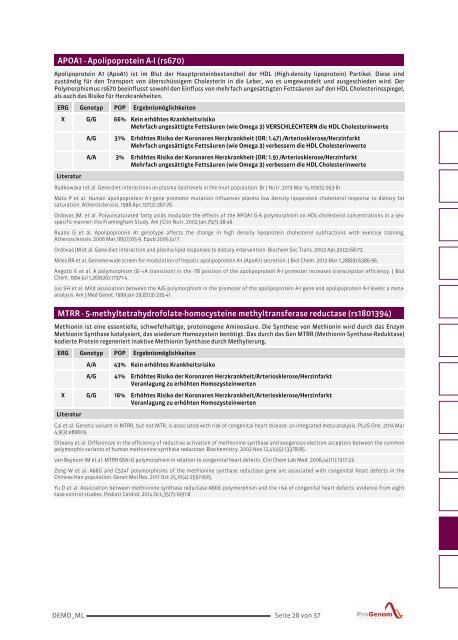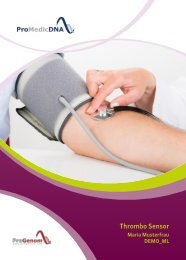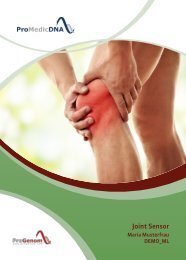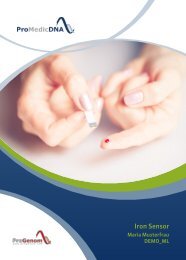Cardiovascular Sensor DEMO DE
medizinische Analyse - ProMedicDNA
medizinische Analyse - ProMedicDNA
Sie wollen auch ein ePaper? Erhöhen Sie die Reichweite Ihrer Titel.
YUMPU macht aus Druck-PDFs automatisch weboptimierte ePaper, die Google liebt.
APOA1 - Apolipoprotein A-I (rs670)<br />
Apolipoprotein A1 (ApoA1) ist im Blut der Hauptproteinbestandteil der HDL (High-density lipoprotein) Partikel. Diese sind<br />
zuständig für den Transport von überschüssigem Cholesterin in die Leber, wo es umgewandelt und ausgeschieden wird. Der<br />
Polymorphismus rs670 beeinflusst sowohl den Einfluss von mehrfach ungesättigten Fettsäuren auf den HDL Cholesterinsspiegel,<br />
als auch das Risiko für Herzkrankheiten.<br />
ERG Genotyp POP Ergebnismöglichkeiten<br />
X G/G 66% Kein erhöhtes Krankheitsrisiko<br />
Mehrfach ungesättigte Fettsäuren (wie Omega 3) VERSCHLECHTERN die HDL Cholesterinwerte<br />
Literatur<br />
A/G 31% Erhöhtes Risiko der Koronaren Herzkrankheit (OR: 1.47) /Arteriosklerose/Herzinfarkt<br />
Mehrfach ungesättigte Fettsäuren (wie Omega 3) verbessern die HDL Cholesterinwerte<br />
A/A 3% Erhöhtes Risiko der Koronaren Herzkrankheit (OR: 1.9) /Arteriosklerose/Herzinfarkt<br />
Mehrfach ungesättigte Fettsäuren (wie Omega 3) verbessern die HDL Cholesterinwerte<br />
Rudkowska I et al. Gene-diet interactions on plasma lipid levels in the Inuit population. Br J Nutr. 2013 Mar 14,109(5):953-61.<br />
Mata P et al. Human apolipoprotein A-I gene promoter mutation influences plasma low density lipoprotein cholesterol response to dietary fat<br />
saturation. Atherosclerosis. 1998 Apr,137(2):367-76.<br />
Ordovas JM. et al. Polyunsaturated fatty acids modulate the effects of the APOA1 G-A polymorphism on HDL-cholesterol concentrations in a sexspecific<br />
manner: the Framingham Study. Am J Clin Nutr. 2002 Jan,75(1):38-46.<br />
Ruano G et al. Apolipoprotein A1 genotype affects the change in high density lipoprotein cholesterol subfractions with exercise training.<br />
Atherosclerosis. 2006 Mar,185(1):65-9. Epub 2005 Jul 7.<br />
Ordovas JM et al. Gene-diet interaction and plasma lipid responses to dietary intervention. Biochem Soc Trans. 2002 Apr,30(2):68-73.<br />
Miles RR et al. Genome-wide screen for modulation of hepatic apolipoprotein A-I (ApoA-I) secretion. J Biol Chem. 2013 Mar 1,288(9):6386-96.<br />
Angotti E et al. A polymorphism (G-->A transition) in the -78 position of the apolipoprotein A-I promoter increases transcription efficiency. J Biol<br />
Chem. 1994 Jul 1,269(26):17371-4.<br />
Juo SH et al. Mild association between the A/G polymorphism in the promoter of the apolipoprotein A-I gene and apolipoprotein A-I levels: a metaanalysis.<br />
Am J Med Genet. 1999 Jan 29,82(3):235-41.<br />
MTRR - 5-methyltetrahydrofolate-homocysteine methyltransferase reductase (rs1801394)<br />
Methionin ist eine essentielle, schwefelhaltige, proteinogene Aminosäure. Die Synthese von Methionin wird durch das Enzym<br />
Methionin Synthase katalysiert, das wiederum Homozystein benötigt. Das durch das Gen MTRR (Methionin-Synthase-Reduktase)<br />
kodierte Protein regeneriert inaktive Methionin Synthase durch Methylierung.<br />
ERG Genotyp POP Ergebnismöglichkeiten<br />
A/A 43% Kein erhöhtes Krankheitsrisiko<br />
A/G 41% Erhöhtes Risiko der Koronaren Herzkrankheit/Arteriosklerose/Herzinfarkt<br />
Veranlagung zu erhöhten Homozysteinwerten<br />
X G/G 16% Erhöhtes Risiko der Koronaren Herzkrankheit/Arteriosklerose/Herzinfarkt<br />
Veranlagung zu erhöhten Homozysteinwerten<br />
Literatur<br />
Cai et al. Genetic variant in MTRR, but not MTR, is associated with risk of congenital heart disease: an integrated meta-analysis. PLoS One. 2014 Mar<br />
4,9(3):e89609.<br />
Olteanu et al. Differences in the efficiency of reductive activation of methionine synthase and exogenous electron acceptors between the common<br />
polymorphic variants of human methionine synthase reductase. Biochemistry. 2002 Nov 12,41(45):13378-85.<br />
van Beynum IM et al. MTRR 66A>G polymorphism in relation to congenital heart defects. Clin Chem Lab Med. 2006,44(11):1317-23.<br />
Zeng W et al. A66G and C524T polymorphisms of the methionine synthase reductase gene are associated with congenital heart defects in the<br />
Chinese Han population. Genet Mol Res. 2011 Oct 25,10(4):2597-605.<br />
Yu D et al. Association between methionine synthase reductase A66G polymorphism and the risk of congenital heart defects: evidence from eight<br />
case-control studies. Pediatr Cardiol. 2014 Oct,35(7):1091-8.<br />
<strong><strong>DE</strong>MO</strong>_ML Seite 28 von 37


















